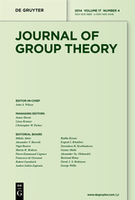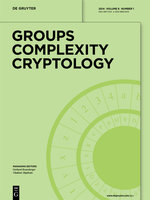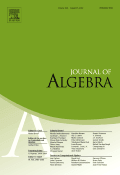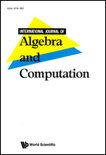
JOURNAL OF GROUP THEORY
Scope & Guideline
Cultivating Knowledge in the Realm of Group Theory
Introduction
Aims and Scopes
- Algebraic Structures of Groups:
Research on the properties, classifications, and structures of different types of groups, including nilpotent, solvable, and simple groups. - Subgroup Theory and Lattices:
Exploration of subgroup lattices, normal subgroups, and their roles in understanding group dynamics and classifications. - Applications of Group Theory:
Application of group theoretical concepts in diverse fields such as cryptography, signal processing, and coding theory. - Graph Theory and Groups:
Investigating the interplay between group theory and graph theory, including the study of graphs defined on groups and their properties. - Computational Group Theory:
Development of algorithms and computational techniques for analyzing group structures and properties, including Galois groups and conjugacy classes.
Trending and Emerging
- Interdisciplinary Applications of Group Theory:
There is a growing trend towards exploring the applications of group theory in fields such as cryptography and quantum computing, highlighting the relevance of mathematical concepts in practical scenarios. - Finite Group Theory and Classification:
An increasing focus on finite groups, particularly their classifications, subgroup structures, and related algorithms, indicates a robust interest in understanding their complexities. - Computational Techniques and Algorithms:
The rise of computational approaches for group analysis, including the study of Galois groups and conjugacy classes, marks a significant trend towards using technology in mathematical research. - Graph-Theoretical Approaches to Group Theory:
Research integrating graph theory with group theory is on the rise, reflecting a trend towards visual and structural analysis of groups through graphical representations. - Advanced Theoretical Frameworks:
Emerging frameworks and theories, such as the exploration of non-abelian tensor products and quasi-commutative structures, indicate an expanding theoretical landscape within group theory.
Declining or Waning
- Classical Group Theory:
Research focused on classical groups and their properties has seen a decrease, possibly due to the growing interest in finite groups and computational approaches. - Geometric Group Theory:
Topics related to geometric aspects of groups, such as topological groups and their geometric representations, appear to be less frequently addressed in recent publications. - Historical Perspectives on Group Theory:
Papers providing historical insights or perspectives on the development of group theory are becoming less common, indicating a shift toward more contemporary issues.
Similar Journals

RENDICONTI DEL SEMINARIO MATEMATICO DELLA UNIVERSITA DI PADOVA
Exploring the frontiers of mathematics with open access insights.RENDICONTI DEL SEMINARIO MATEMATICO DELLA UNIVERSITA DI PADOVA, published by the European Mathematical Society, stands as a notable open-access journal with a rich history in disseminating research across various domains of mathematics. With an ISSN of 0041-8994 and E-ISSN 2240-2926, this journal has embraced open access since 2023, significantly enhancing its visibility and accessibility to a global audience. Situated in Germany, its publishing house is based at Technical University Berlin, which emphasizes its academic roots and dedication to fostering mathematical research. The journal features a quartile ranking of Q3 across multiple categories including Algebra and Number Theory, Analysis, Geometry and Topology, and Mathematical Physics as of 2023, indicating a vibrant contribution to the field, despite its challenge in specific rankings. Researchers, professionals, and students alike will find in this journal a platform for innovative ideas and significant findings that are crucial to the evolution of modern mathematics.

Journal of Combinatorial Algebra
Unveiling the Complexities of Algebra and CombinatoricsThe Journal of Combinatorial Algebra, published by the European Mathematical Society (EMS), is a pioneering open-access journal dedicated to advancing research in the fields of Algebra and Number Theory, as well as Discrete Mathematics and Combinatorics. Since its inception in 2018, the journal has been committed to promoting high-quality, rigorous research, evidenced by its 2023 scopus rankings placing it in the second quartile across both disciplines. It serves as a vital platform for academics, researchers, and students to share innovative findings, methodologies, and theoretical advancements within combinatorial algebra, facilitating collaboration and knowledge dissemination in the mathematical community. With its open access policy adopted in 2021, the journal ensures that its content is freely available to a global audience, further enriching the landscape of mathematical research. The journal's editorial board, composed of leading experts, guarantees the integrity and academic excellence of published articles, making it an essential resource for those engaged in the dynamic fields of combinatorics and algebra.

TRANSACTIONS OF THE AMERICAN MATHEMATICAL SOCIETY
Elevating the Standards of Mathematical ScholarshipTRANSACTIONS OF THE AMERICAN MATHEMATICAL SOCIETY, published by the American Mathematical Society, is a premier journal in the field of mathematics that has been contributing to the advancement of mathematical knowledge since 1900. With an ISSN of 0002-9947 and an E-ISSN of 1088-6850, this journal holds a prestigious position in the academic landscape, evidenced by its Q1 rankings in both Applied Mathematics and Miscellaneous Mathematics categories as of 2023. With a Scopus ranking of #97 in General Mathematics and a percentile standing of 75th, the journal is recognized for its rigorous peer-review process and the quality of the research it publishes. Though it does not currently offer open access options, it essentially serves as a vital resource for researchers, professionals, and students seeking critical insights and developments in mathematical theory and applications. The Transactions aim to publish high-quality research articles that foster the exchange and dissemination of ideas, supporting the growth of both theoretical and applied mathematics within the global scholarly community.

Groups Complexity Cryptology
Connecting Minds in the Realm of Complexity and SecurityGroups Complexity Cryptology, published by EPISCIENCES, is an esteemed Open Access journal that has been contributing to the fields of Applied Mathematics, Computational Mathematics, Computational Theory, and Computer Networks and Communications since its inception in 2009. With its headquarters located in France, this journal serves as a crucial platform for disseminating innovative research and solutions in cryptology and related areas. As of 2023, it proudly holds Q4 rankings across several categories in Scopus, indicating its recognized, yet emerging position within the academic community. Additionally, it is indexed under various categories such as Applied Mathematics, where it ranks in the 24th percentile, showcasing its potential for growth and increased visibility among researchers. The journal adheres to an open-access model introduced in 2020, allowing for widespread accessibility and engagement with cutting-edge research. This enhances the journal's mission to foster academic communication and collaboration among researchers, professionals, and students interested in the complex interplay of groups, complexity, and cryptography.

Mediterranean Journal of Mathematics
Advancing Mathematical Frontiers in the Mediterranean BasinThe Mediterranean Journal of Mathematics, published by SPRINGER BASEL AG, is a prominent platform dedicated to the advancement of mathematical research and education. Since its inception in 2004, this journal has been pivotal in disseminating high-quality research across various fields of mathematics, currently holding a notable Q2 ranking in the miscellaneous mathematics category as of 2023. With its ISSN 1660-5446 and E-ISSN 1660-5454, the journal enjoys a respected position in the academic community, evident by its Scopus rank of 129 out of 399 in General Mathematics, placing it in the 67th percentile. While primarily a subscription-based journal, it remains committed to providing a comprehensive resource for researchers, professionals, and students, fostering dialogue and exploration within the mathematical sciences. The Mediterranean Journal of Mathematics, based in Basel, Switzerland, continues to contribute significantly to the evolution of mathematical theory and practice, marking its relevance as we approach its 20th anniversary in 2024.

MONATSHEFTE FUR MATHEMATIK
Connecting Past Insights with Future DiscoveriesMONATSHEFTE FUR MATHEMATIK, published by Springer Wien, stands as a pivotal academic journal in the field of mathematics, with its esteemed history tracing back to 1890. With an ISSN of 0026-9255 and an E-ISSN of 1436-5081, this journal encompasses a rich array of topics and contributions within the realm of mathematical research, catering to both historical and contemporary discourse. Although not an open access journal, it maintains a Q2 rank in the mathematical category as per the 2023 assessment, illustrating its significant impact and relevance, as evidenced by its Scopus ranking of #160/399, placing it at the 59th percentile within the general mathematics category. Published in Austria, MONATSHEFTE FUR MATHEMATIK provides a platform for researchers, professionals, and students to explore innovative mathematical theories and applications through its various converged years of contributions, from 1890 to 2024. This journal is an essential resource for anyone invested in advancing their understanding of mathematical concepts and fostering scholarly dialogue in the field.

JOURNAL OF ALGEBRA
Unraveling Complex Algebraic ConceptsThe JOURNAL OF ALGEBRA, published by Academic Press Inc. Elsevier Science, is a premier scholarly outlet dedicated to the field of algebra and number theory. With its impressive Q1 ranking in the 2023 category of Algebra and Number Theory and a solid Scopus rank of #46 out of 119, it stands as a crucial resource for researchers and professionals seeking to deepen their understanding of advanced algebraic concepts. Operating since 1964 and continuing through 2025, the journal boasts a rich history of publishing influential research that drives the discipline forward. While the journal does not currently offer open access options, it remains committed to providing high-quality peer-reviewed content to the academic community. Its comprehensive archive and cutting-edge research articles serve as essential tools for students, researchers, and practitioners aiming to stay at the forefront of algebraic studies.

INTERNATIONAL JOURNAL OF ALGEBRA AND COMPUTATION
Pioneering Research in Algebra and Computational TheoryThe INTERNATIONAL JOURNAL OF ALGEBRA AND COMPUTATION, published by WORLD SCIENTIFIC PUBL CO PTE LTD, is a prominent platform in the field of mathematics, specifically focusing on algebraic structures and computational methods. With a publication history dating back to 1996 and converging to 2024, this journal has established a significant presence within the academic community, as reflected in its Q2 category ranking in Mathematics and its position in the Scopus 45th percentile for General Mathematics. Although it does not offer Open Access, researchers can access a wealth of original research articles, comprehensive reviews, and groundbreaking findings that contribute to the advancement of mathematical theory and its applications. This journal not only serves as an invaluable resource for mathematicians but also encourages interdisciplinary research by appealing to professionals and students alike who seek to deepen their understanding of algebra and computation methodologies.

Advances in Mathematics of Communications
Advancing Knowledge in Algebra, Number Theory, and BeyondAdvances in Mathematics of Communications, published by the American Institute of Mathematical Sciences (AIMS), is a leading journal dedicated to the dissemination of high-quality research in the fields of algebra, number theory, applied mathematics, discrete mathematics, combinatorics, and computer networks. Established in 2008, this journal has quickly established itself as a significant contributor to mathematical communications, holding a reputable position in the Scopus rankings, with impressive category quartiles, including Q2 rankings in key areas such as Algebra and Number Theory and Applied Mathematics. Besides its rigorous peer-review process, the journal facilitates the growth of innovative ideas and methodologies that bridge the gap between theory and application. With no open access restrictions, Advances in Mathematics of Communications aims to provide an inclusive platform for researchers, professionals, and students to share their findings and insights, fostering collaboration and advancing the global knowledge base in the mathematical sciences. The journal's commitment to excellence ensures its role as an essential resource in the ever-evolving landscape of mathematics.

MICHIGAN MATHEMATICAL JOURNAL
Unveiling New Perspectives in Mathematics Since 1996The MICHIGAN MATHEMATICAL JOURNAL is a prestigious and influential publication in the field of mathematics, founded by the University of Michigan. With an ISSN of 0026-2285 and an E-ISSN of 1945-2365, this journal is recognized for its high-quality research and has achieved a commendable Q1 ranking in the category of Mathematics (miscellaneous) as of 2023. Published by the esteemed Michigan Mathematical Journal, it provides a platform for the dissemination of innovative mathematical theories and findings, playing a crucial role in advancing knowledge and scholarship within the mathematical community. With coverage spanning from 1996 to 2024, the journal emphasizes rigorous theoretical development and fosters collaboration among researchers, professionals, and students alike. While not an open-access journal, its contributions are invaluable for those looking to stay abreast of cutting-edge mathematical research.